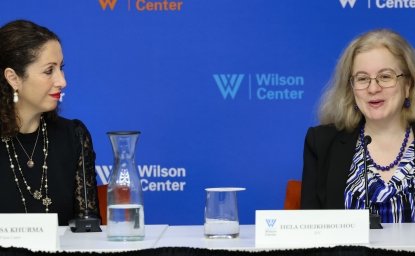It is with great pride and excitement that we introduce to you our first Global Women’s Leadership Initiative (GWLI) Newsletter.
As the newest initiative at the Woodrow Wilson International Center for Scholars, the GWLI was launched at a historic time when the call to women’s leadership has never been more critical.
The evidence is now clear that women’s decision-making at all levels leads to better development outcomes and inclusive policymaking. From India to Morocco to Kosovo to the U.S., critical issues such as healthcare, childcare, sexual harassment, domestic violence, and equal pay for equal work are given priority when women are at the table. Without women’s presence at the decision-making table, urgent concerns that impact half of the world often remain silenced.
The GWLI is honored to be the new home of the Women in Public Service Project (WPSP) launched in 2011 by Secretary Hillary Clinton in partnership with the State Department and the historic Seven Sisters Colleges-- Barnard, Bryn Mawr, Mount Holyoke, Smith, and Wellesley. It has now expanded to include Scripps, Mills, and Mount St. Mary’s Colleges, and will continue to grow in the U.S. and around the world. The primary goal of the WPSP is to achieve the goal of fifty percent women in public service by 2050 (“Fifty by Fifty”).
The WPSP’s hallmark programs are the Learning Institutes that are led by partner institutions and affiliated academic and governmental institutions around the world. These Institutes are heralded as premier learning institutes for women already in or aspiring to enter public service. The Institutes are vibrant incubators for women’s leadership for emerging women leaders to engage in and share expertise on model constitutional drafting, legislative drafting, peace and conflict negotiations, transitional justice processes, movement building and networking, and to strategize on transcending barriers and challenges to women’s public service. The WPSP is defined by its enduring peer-to-peer and two-way mentoring program that helps to sustain the partnerships built at the Institute and continues an engagement with the GWLI’s ever expanding network of global partners.
The GWLI’s network bridges emerging women leaders with women leaders of state and government. We hope through our flagship annual publication, the Global Policy Review: Reaching the 50 by 50 Challenge, to map the progress around the world on law, policy, institutional, and programmatic reform on meeting the goal of 50 percent women in public service by 2050.
Women’s leadership is the defining cause of our times. It is both a moral imperative and a development solution. In the United States, women leaders have helped pass bills that make women and families more secure. This legislation has included the Violence Against Women Act of 1994 and the Family and Medical Leave Act of 1993. Other measures have increased assistance for survivors of domestic violence, increased penalties for batterers, supported federal rape-shield laws to protect rape victims, and furthered policies on payment of child support by non-custodial parents.
Across the world, too, when women are at the table, legislatures pass policies and measures that advance the development of women, their families, and their countries. Rwanda boasts the highest proportion of women parliamentarians in the world and is the only country with a majority of women in parliament. Working across party lines, the Forum of Women Parliamentarians helped pass a law combating violence against women. When the number of women in the Costa Rican parliament reached a critical mass of over 30 percent, a General Law on the Protection of Adolescent Mothers was promulgated to provide free health services and education to young women. In Tanzania, a gender quota was enacted to ensure that women held no less than 20 percent of the seats in parliament. Because of their presence, an amendment to the Land Act grants women equal access to land, loans, and credit. In India, at the local level, women-led village councils approved 60 percent more drinking water projects than those led by men.
Also in India, gender quotas at the local government level increased the percentage of elected leaders who were women from less than 5 percent in 1992 to over 40 percent by 2000. Evidence shows that women in elected office in India are more likely to invest in public infrastructure—particularly safe drinking water—than their male counterparts and are less likely to feed into corruption. Women’s leadership yields not just high dividends in terms of development and the rule of law. The power of women as role models has intergenerational transformative impact. Having a woman in power can inspire peers and the future generations of women. Recent studies in India show that when women leaders are more visible in a community, girls and their families establish a broader perspective for the future of their daughters, which includes delaying marriage, completing primary education, and working after marriage.
Globally, 139 constitutions include guarantees of gender equality, 125 countries outlaw domestic violence, and 117 countries have equal pay laws. Yet translating laws on paper into practice remains a challenge. When women are equally represented in decision-making and in public service, there is a greater potential for the implementation of laws and policies that positively impact all.
That is why, at the GWLI, we reaffirm our dedication to the goal of “Fifty by Fifty.” We invite you to read about our work and join us in this global movement and recommit yourself to this urgent cause.
Sincerely,
Rangita de Silva de Alwis
Director, Global Women’s Leadership Initiative






